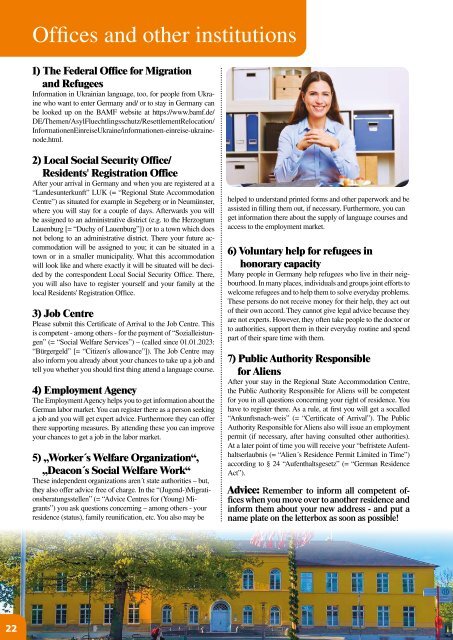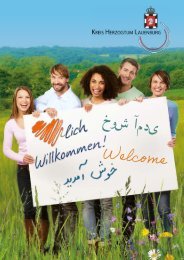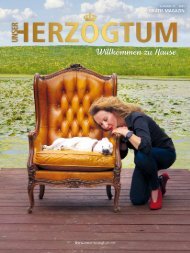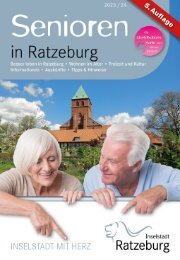Kreis Herzogtum Lauenburg - Willkommen- ukrainisch, russisch
Create successful ePaper yourself
Turn your PDF publications into a flip-book with our unique Google optimized e-Paper software.
Offices and other institutions Arriving and first orientation<br />
1) The Federal Office for Migration<br />
and Refugees<br />
Information in Ukrainian language, too, for people from Ukraine<br />
who want to enter Germany and/ or to stay in Germany can<br />
be looked up on the BAMF website at https://www.bamf.de/<br />
DE/Themen/AsylFluechtlingsschutz/ResettlementRelocation/<br />
InformationenEinreiseUkraine/informationen-einreise-ukrainenode.html.<br />
Food bank ("Die Tafel")<br />
The “Foodbank” is an institution where needy people can<br />
purchase at fixed times food at reduced prices. Sometimes<br />
the cost-sharing amounts to only € 1.- - € 2.- for the entire<br />
purchase. Register there and you will get in return a correspondent<br />
certificate.<br />
Shopping<br />
2) Local Social Security Office/<br />
Residents' Registration Office<br />
After your arrival in Germany and when you are registered at a<br />
“Landesunterkunft” LUK (= “Regional State Accommodation<br />
Centre”) as situated for example in Segeberg or in Neumünster,<br />
where you will stay for a couple of days. Afterwards you will<br />
be assigned to an administrative district (e.g. to the <strong>Herzogtum</strong><br />
<strong>Lauenburg</strong> [= “Duchy of <strong>Lauenburg</strong>”]) or to a town which does<br />
not belong to an administrative district. There your future accommodation<br />
will be assigned to you; it can be situated in a<br />
town or in a smaller municipality. What this accommodation<br />
will look like and where exactly it will be situated will be decided<br />
by the correspondent Local Social Security Office. There,<br />
you will also have to register yourself and your family at the<br />
local Residents' Registration Office.<br />
3) Job Centre<br />
Please submit this Certificate of Arrival to the Job Centre. This<br />
is competent - among others - for the payment of “Sozialleistungen”<br />
(= “Social Welfare Services”) – (called since 01.01.2023:<br />
“Bürgergeld” [= “Citizen's allowance”]). The Job Centre may<br />
also inform you already about your chances to take up a job and<br />
tell you whether you should first thing attend a language course.<br />
4) Employment Agency<br />
The Employment Agency helps you to get information about the<br />
German labor market. You can register there as a person seeking<br />
a job and you will get expert advice. Furthermore they can offer<br />
there supporting measures. By attending these you can improve<br />
your chances to get a job in the labor market.<br />
5) „Worker´s Welfare Organization“,<br />
„Deacon´s Social Welfare Work“<br />
These independent organizations aren´t state authorities – but,<br />
they also offer advice free of charge. In the “(Jugend-)Migrationsberatungsstellen”<br />
(= “Advice Centres for (Young) Migrants”)<br />
you ask questions concerning – among others - your<br />
residence (status), family reunification, etc. You also may be<br />
helped to understand printed forms and other paperwork and be<br />
assisted in filling them out, if necessary. Furthermore, you can<br />
get information there about the supply of language courses and<br />
access to the employment market.<br />
6) Voluntary help for refugees in<br />
honorary capacity<br />
Many people in Germany help refugees who live in their neigbourhood.<br />
In many places, individuals and groups joint efforts to<br />
welcome refugees and to help them to solve everyday problems.<br />
These persons do not receive money for their help, they act out<br />
of their own accord. They cannot give legal advice because they<br />
are not experts. However, they often take people to the doctor or<br />
to authorities, support them in their everyday routine and spend<br />
part of their spare time with them.<br />
7) Public Authority Responsible<br />
for Aliens<br />
After your stay in the Regional State Accommodation Centre,<br />
the Public Authority Responsible for Aliens will be competent<br />
for you in all questions concerning your right of residence. You<br />
have to register there. As a rule, at first you will get a socalled<br />
“Ankunftsnach-weis” (= “Certificate of Arrival”). The Public<br />
Authority Responsible for Aliens also will issue an employment<br />
permit (if necessary, after having consulted other authorities).<br />
At a later point of time you will receive your “befristete Aufenthaltserlaubnis<br />
(= “Alien´s Residence Permit Limited in Time”)<br />
according to § 24 “Aufenthaltsgesetz” (= “German Residence<br />
Act”).<br />
Advice: Remember to inform all competent offices<br />
when you move over to another residence and<br />
inform them about your new address - and put a<br />
name plate on the letterbox as soon as possible!<br />
The social department store<br />
You will find so called Six-Penny Department Stores in<br />
many cities. Donated, well-preserved clothes, household<br />
goods and furniture are sold there at a reasonable price.<br />
The Clothing Store<br />
In a Clothing Store (run for e.g. by the German Red Cross)<br />
you can get used but well-preserved clothes, textiles and<br />
shoes as well as smaller household and home commodities.<br />
Everything is given for free of charge or against a<br />
small contribution.<br />
Advice: Ask your Local Social Security Office<br />
or Advice Centre for Migrants for such<br />
addresses in your region.<br />
Opening hours<br />
• Most shops in Schleswig-Holstein are open from Monday to<br />
Saturday (Mon.-Sat.). Only restaurants, petrol stations and a<br />
few other shops are allowed to open on Sunday.<br />
• Supermarkets are usually open until 8 pm, sometimes longer.<br />
• There are many public holidays in Germany; shops are closed<br />
during these days, e.g. on Christmas (25. + 26. December),<br />
Public Holiday in Commemoration of the German Unification<br />
(3 October).<br />
• Keep the sales vouchers if you buy expensive, durable commodities.<br />
Often you can return an article if, for example, it is<br />
broken when you bought it. Some shops even grant a guarantee<br />
period during which they allow repairs or exchange. However,<br />
this always depends on the product and the seller.<br />
• Return empty returnable bottles to the supermarket and receive<br />
the deposit fee (e.g. € 0.02.- - €,0.03.-, € 0.08.- - € 0.15.-<br />
- € 0.25.-) in return! (https://www.mehrweg.org/einkaufen/<br />
pfand/). There are various signs by which you can recognize<br />
deposit bottles.<br />
For example these:<br />
Public holidays in Schleswig-Holstein<br />
01.01.<br />
Alternating<br />
Alternating<br />
01.05.<br />
Alternating<br />
Alternating<br />
03.10.<br />
31.10.<br />
25.12.<br />
26.12.<br />
New Year´s Day<br />
Good Friday<br />
Easter Monday<br />
Labour Day<br />
Ascension Day<br />
Whit Monday<br />
Day to Commemorate the Reunification of Germany<br />
Reformation Day<br />
1rst Chrismas Day<br />
2nd Christmas Day<br />
22<br />
23














